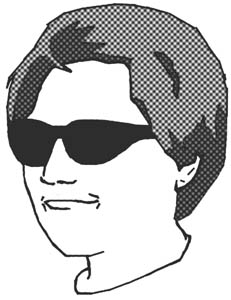![[Metroactive Features]](/features/gifs/feat468.gif)
[ Features Index | Silicon Valley | Metroactive Home | Archives ]

Techsploits Who Owns Your Thoughts? By Annalee Newitz INTELLECTUAL PROPERTY lawyer Robin Gross keeps a windup Mickey Mouse toy on her desk next to a photograph of armed guerrillas. The contrast suits her. Gross, a consumer-advocacy freedom fighter, has devoted her professional career to challenging big copyright holders. Now that her new nonprofit group, IP Justice, has set up shop in a sunny office in the Haight Ashbury district of San Francisco, Gross is busy working to keep intellectual property (like Mickey) in the public domain where it belongs. "Copyright and IP law was originally designed to promote public welfare," Gross says. Intellectual property, unlike real estate, is designed to pass into the public domain. That's why there are limitations on the number of years a person can hold a copyright, trademark or patent. The idea is to create a system where inventors and creators are rewarded for their work financially but which also allows the public "fair use" of the property so that they can build even better inventions with it, communicate better or simply learn something valuable. It's almost a misnomer to call creative works a form of property because a song or piece of software cannot be owned in the same way houses or cars can be. "IP isn't like real property," Gross asserts. "Copyright allows the owner to lease their property to others before it falls into the public domain. This never happens with real property. You don't have a fair-use right to take someone's house away from them after they've owned it a few years." Recently, however, consumers have been fighting a losing battle with copyright holders. The Supreme Court upheld a law extending copyright limits for an additional 20 years. The RIAA is hunting down copyright violators and suing them for millions of dollars. And anyone who tries to circumvent software that prohibits fair-use copying of CDs or DVDs risks doing jail time. Gross, who was involved in key court cases about the legality of peer-to-peer software and the right to reverse-engineer copy protection schemes, is currently fired up about a new international treaty called the Free Trade of the Americas Agreement (FTAA). IP Justice has a strong international focus, with board members who hail from all over the world. For Gross, international treaties are the future of IP consumer advocacy. The FTAA, if ratified, would bring 34 different countries into conformity on IP laws. And these laws are strongly skewed to benefit copyright holders. "Why should developing countries adopt the policies of IP export countries?" asks Gross. The only two countries in the world that are net IP exporters are the United States and the United Kingdom. Every other country imports more IP than it exports, making most of the global population into IP have-nots. That's why developing nations like Brazil are strongly against the IP chapter in the FTAA, and why advocates like Gross are hoping to influence what goes into the treaty before its hoped-for ratification date in early 2005. IP may not be analogous to physical property, but what the two have in common is their concentration in the hands of the wealthy. Seventy-nine countries have signed on to the World Intellectual Property Organization, which makes sure nations respect each others' IP laws. But some countries are rebelling against the current IP regime. India, for example, refuses to allow patents on medicines. "They need medicine, and if they abide by U.S. patents, that would create a health crisis," Gross explains. Also, the governments of India, Brazil and Peru only use open-source software, which means they aren't forced to pay steep copyright licensing fees to gigantic IP hoarders like Microsoft. The global economic future is sure to be deeply bound up with IP and the laws that govern its use. While sometimes it may seem that nothing could be worse than the U.S.' Digital Millennium Copyright Act, the IP chapter of the FTAA threatens to make the DMCA look like a walk in the park. For example, it vastly expands the criminal penalties brought against copyright infringers like file sharers on Kazaa. "Peer-to-peer sharers will be eligible for imprisonment," Gross warns. Luckily, her organization is out there fighting for truth and IP justice.
Annalee Newitz (freeintellectual@techsploitation.com) is a surly media nerd who has been forced to sell her thoughts to the highest bidder.
Send a letter to the editor about this story to letters@metronews.com. [ Silicon Valley | Metroactive Home | Archives ]
|
From the October 16-22, 2003 issue of Metro, Silicon Valley's Weekly Newspaper.
Copyright © Metro Publishing Inc. Metroactive is affiliated with the Boulevards Network.
For more information about the San Jose/Silicon Valley area, visit sanjose.com.